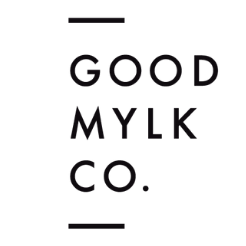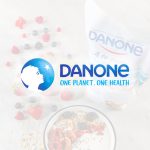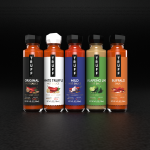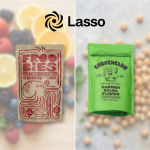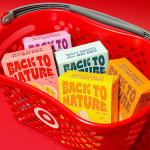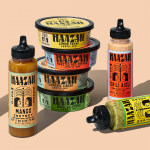Concentrated Growth: Brands See Future in New Alt-Dairy Format
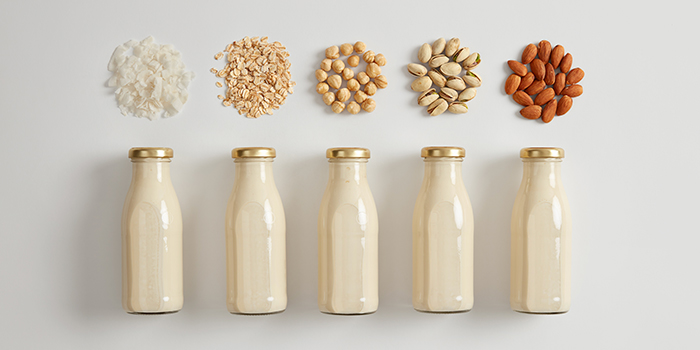
The alt-dairy industry has staked a claim among nearly a third of American consumers, particularly younger generations like Gen Z. But, within that new wave of plant-based milks, a handful of brands are hoping to disrupt conventional thinking around how such products are packaged and sold.
Alternative dairy concentrates, which come in a range of powders, pastes and frozen cubes, still have a relatively small presence in retail. But the hyper-condensed, low ingredient format has unlocked numerous initial opportunities to grow awareness for the innovation elsewhere, particularly within wholesale and foodservice businesses.
According to the Good Food Institute (GFI), the alternative dairy milk category grew 6% to $19.1 billion in total dollar sales between 2021 and 2022; however, innovation in the category has been centered primarily around the use of novel ingredient bases such as various seeds, grains and nuts. As the space has grown, brands including the likes of JOI, Goodmylk Co., SPIN and Planut Goods have entered with a new approach to innovation.
“We are pro-acting against food tech,” said Mike Lebowitz, co-founder of Planut Goods. “We’re not trying to feed everyone through ChatGPT and AI. If you take a look at those ingredient lists, they’re just a laundry list of fractured foods. We feel simplicity isn’t a trend and it’s something that’s here to stay… we’re trying to follow suit with that and get closer to nature, not further away from it.”
Importantly, concentrates circumvent one of the main challenges in traditional liquid plant milks: they do not require the use of emulsifiers or gums to maintain the product’s integrity. Many of the companies operating in this concentrated corner of the category also highlight the small volumes of the respective plant-base typically used in alternative milks, which on average are composed of 98% water. They believe this concentrated format offers a cleaner, fresher, more sustainable, more versatile and superior alternative to traditional alt-dairy.
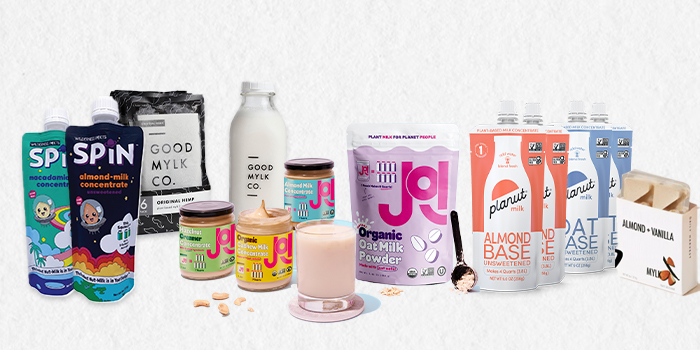
Who is Playing In Alt-Alt Dairy?
JOI (‘Just One Ingredient’), was an early adopter of the format and launched in September 2018 after identifying whitespace for a fresher, more convenient alt-milk. The company initially focused on foodservice and soon after, began selling its condensed almond and cashew milk bases online.
With a proprietary process that forgoes the use of high heat, which is often used to transform nuts into nut butter, the brand instead breaks down the entire base ingredient into minuscule small particles that can then be blended with water. The resulting packaged concentrate is a full-fat plant protein that does not experience oil separation or offer a grainy mouthfeel.
According to JOI CEO Hector Gutierrez, each of the company’s three co-founders brought a unique need-state to the table that they aimed to solve with JOI: “One of them wanted to eliminate plastic waste…the other one was recently becoming aware that he was lactose intolerant and then our third co-founder was already making plant-milk at home, from scratch.”
A 15 oz. glass jar of JOI’s almond or cashew base makes approximately 7 quarts of alt-milk and is available for $19.99. Comparatively, a quart of alt-milk made with JOI would cost $2.85 while a quart of Silk or Almond Breeze retails for approximately $3.50. JOI also sells an Oat milk powder which is available in a 1.46 lb bag in addition to a bulk size hemp milk based intended for wholesale use.
Newcomers to the category – Planut Goods, which launched in the U.S. in December 2022, and SPIN, which debuted at the Winter Fancy Food Show in January – are also looking to build off of similar propositions such as cleaner ingredient labels, fresher end products, lower climate impact and better value.
Planut Goods sells three pouched concentrates – Unsweetened Almond, Unsweetened Oat and Barista, which combines cashews, almonds and hazelnuts – for approximately $15 per 9 oz. pouch. SPIN sells Almond, Cashew and Macadamia nut bases in a range of flavors and in both sweetened and unsweetened varieties online for about $8 per 8 oz. squeeze pouch. While the pouches are not recyclable, the product uses less packaging compared to traditional alt-milk formats.
Both Planut and JOI don’t focus too heavily on positioning the product around its sustainability attributes, instead preferring to highlight the versatility of the format, which can be used as a non-dairy base for yogurt, ice cream and coffee creamers and more.
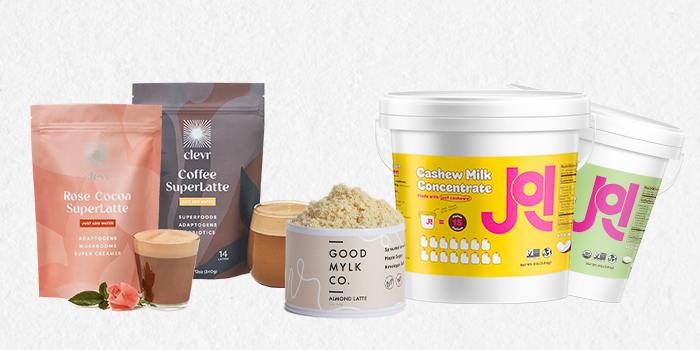
Convenience Takes On New Looks
With all of the format’s positive attributes, also comes a new form of convenience and getting American shoppers to buy-in may be an initial hurdle to the subset’s growth. Australia-based Planut Goods said it saw “incredible” growth in its home market following a launch in August 2022, but noted that stateside adoption has been a bit slower.
The company soft launched its U.S. e-commerce site late last year; however, Leibowitz believes Americans’ desire for convenience in the form of “immediate gratification” will make consumer education increasingly important to jump-start the adoption of concentrates and teach shoppers about the convenience and food waste benefits. Planut Goods products are shelf stable for 18 months and shoppers are able to make as little or as much as they need.
Despite the slower start, Leibowitz believes what they are building at Planut Goods has the ability to grow and sustain for the long run. He said once American consumers catch on they are quick to convert and “typically louder” about the products they enjoy. The company has also launched a line of low-ingredient list nut butters online in Australia.
“Milk is just the start,” said Leibowitz. “We think the sky’s the limit as far as building a [plant-based food] lifestyle brand.”
Gutierrez said JOI has also seen plenty of interest from the international market as well including consumers in Europe and Asia. While he believes there is a heightened awareness around clean label eating and ingredient sourcing in those regions of the world, he said the brand sees plenty of opportunity in the U.S. and will continue to focus on growing in its own backyard.
While these brands work to gain traction among U.S. consumers, they’ve had no issue winning over wholesale and foodservice operators with larger bulk formats. JOI, Planut Goods and SPIN are all selling the ingredient to coffee shops, cafes, ice cream parlors and smoothie stores, in addition to a range of other foodservice operations, as a means to scale in the near term. JOI and SPIN offer their bases in numerous bulk sizes ranging from 1 gallon to 5 gallon pails.
The concentrate format can also provide a convenient path into new business segments. Plant-based food brand Daily Harvest has a line of concentrated alt-milks that come frozen in cube formats and can be blended with water to make milk, or added to its frozen smoothies. Elsewhere, JOI is selling as an ingredient to CPG companies to serve as the base of products ranging from ready-to-drink plant milk beverages to chocolate bars and alt-cheese products, according to Gutierrez.
Brands such as Laird and instant latte maker Clevr already use powdered oat concentrates in instant latte formulations. Alt-milk concentrate brand Goodmylk Co., which sells frozen hemp and almond milk concentrates, also produces a powdered, oat-based instant latte line. Gutierrez said he sees synergies between coffee culture and the rise of plant-based dairy, making coffee shops a natural channel for sales.
“So many [single origin] sourcing narratives are being done around coffee beans…and for this expert barista, who can pull your perfect espresso on this machine that costs [thousands of dollars] — shouldn’t they be able to complement that with an equally, thoughtfully-sourced milk alternative?”
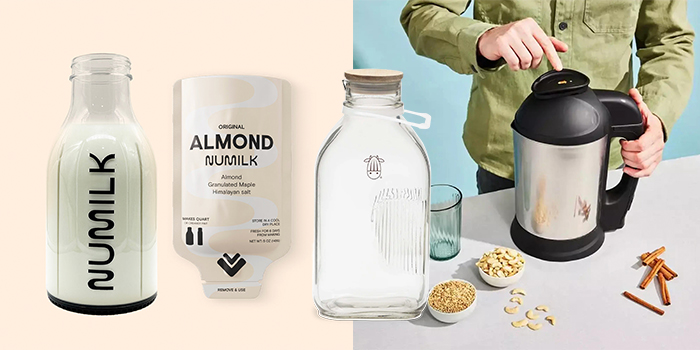
Questions Around Path to Market, Retail Growth Remain
The majority of brands selling this format have focused on direct-to-consumer sales meaning that traction in retail is still nascent. Though these products will likely land on shelf in the ambient plant milk aisle, according to Gutierrez and Leibowitz, questions remain around what area of the store will help drive consumer awareness most effectively so these businesses can spur growth beyond early adopters.
Since there are only a handful of brands operating in the space, data platforms such as SPINS, IRI and Nielsen were unable to provide format-specific sales data. Investor interest in the category is also difficult to gauge. Goodmylk has raised over $8 million in venture funding from undisclosed investors according to Crunchbase, but all other players have funded growth through their own sales thus far. Still, success is far from guaranteed. Alt-milk concentrate brand Modest Mylk ceased operations in 2021 after only two years in business.
Plant-based dairy brands utilizing traditional, already-liquid formats have also been working to solve the clean ingredient hurdle. MALK, New Barn Organics and Califia Farms all sell lines of alt-dairy milks that don’t contain gums, emulsifiers or oils and highlight their low ingredient lists.
Alt-dairy food tech company Numilk had originally designed machines for retail and foodservice outlets that made fresh plant-based milk from the brand’s pouched concentrates in under 30 seconds, but they have since pivoted to selling smaller countertop machines and pouches for personal use. JOI, which began with an idea similar to Numilk, has found that a focus on simple ingredients wins at the end of the day.
“The first idea was actually a machine – think espresso for almond milk,” said Gutierrez, who explained the company went so far to develop prototypes and begin working with engineers in India. “A couple of things we realized: one, [none of our co-founders] had a love for machine manufacturing… and two, there’s actually a simpler way to go about this which is focusing on the product that goes inside.”
That’s what JOI intends to do as it grows its business and introduces new plant-based innovations. The company believes that by maintaining a focus on simple ingredients and responsible sourcing that it will be well positioned to build a plant-based food business that can sustain any shifting food trends.
“There’s always ebbs and flows of different narratives that are important to people,” said Gutierrez. “We want to be really focused on building a brand that can be 100 years old, and people come to it because it’s a reliable source of really high quality plant food products.”


